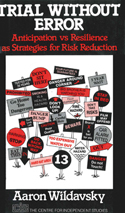
Safety regulations are proliferating at a great rate in society today, attempting to protect us from hundreds of known and unknown dangers. It is the unknown dangers that Aaron Wildavsky addresses here. Do restrictive regulations really reduce risk?
‘Trial and error’ is the cornerstone of science. Without trial there can be no error, but without error there is no learning. Regulations that prohibit even the testing of new technology, nuclear power technology for example, force innovators to guarantee before they start that there will be no errors. Even the most benign technology would never have been established if it first had to demonstrate that it did no harm.
Avoiding risk by trying to regulate it away has a surprising implication: making innovation more costly means there will be fewer departures from past practice, and this very lack of change may increase risk.
